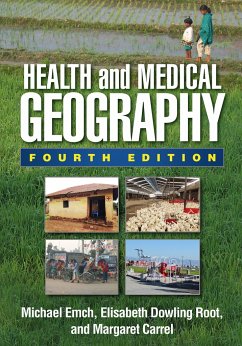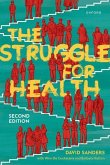- Gebundenes Buch
- Merkliste
- Auf die Merkliste
- Bewerten Bewerten
- Teilen
- Produkt teilen
- Produkterinnerung
- Produkterinnerung
Why are rainfall, carcinogens, and primary care physicians distributed unevenly over space? The fourth edition of the leading text in the field has been updated and reorganized to cover the latest developments in disease ecology and health promotion across the globe. The book accessibly introduces the core questions and perspectives of health and medical geography and presents cutting-edge techniques of mapping and spatial analysis. It explores the intersecting genetic, ecological, behavioral, cultural, and socioeconomic processes that underlie patterns of health and disease in particular…mehr
Andere Kunden interessierten sich auch für
![A Geography of Russia and Its Neighbors A Geography of Russia and Its Neighbors]() Mikhail S. BlinnikovA Geography of Russia and Its Neighbors91,99 €
Mikhail S. BlinnikovA Geography of Russia and Its Neighbors91,99 €![Anatomy of an Epidemic Anatomy of an Epidemic]() Robert WhitakerAnatomy of an Epidemic14,99 €
Robert WhitakerAnatomy of an Epidemic14,99 €![Computing Geographically Computing Geographically]() David O'SullivanComputing Geographically74,99 €
David O'SullivanComputing Geographically74,99 €![Zika Zika]() Debora DinizZika113,99 €
Debora DinizZika113,99 €![The Coronavirus Crisis and Its Teachings The Coronavirus Crisis and Its Teachings]() Roland BenedikterThe Coronavirus Crisis and Its Teachings45,99 €
Roland BenedikterThe Coronavirus Crisis and Its Teachings45,99 €![Dogs, Zoonoses and Public Health Dogs, Zoonoses and Public Health]() Dogs, Zoonoses and Public Health277,99 €
Dogs, Zoonoses and Public Health277,99 €![The Struggle for Health The Struggle for Health]() David Sanders (Emeritus Professor, Emeritus Professor, School of PuThe Struggle for Health56,99 €
David Sanders (Emeritus Professor, Emeritus Professor, School of PuThe Struggle for Health56,99 €-
-
-
Why are rainfall, carcinogens, and primary care physicians distributed unevenly over space? The fourth edition of the leading text in the field has been updated and reorganized to cover the latest developments in disease ecology and health promotion across the globe. The book accessibly introduces the core questions and perspectives of health and medical geography and presents cutting-edge techniques of mapping and spatial analysis. It explores the intersecting genetic, ecological, behavioral, cultural, and socioeconomic processes that underlie patterns of health and disease in particular places, including how new diseases and epidemics emerge. Geographic dimensions of health care access and service provision are addressed. More than 100 figures include 16 color plates; most will be available as PowerPoint slides at the companion website. &
Hinweis: Dieser Artikel kann nur an eine deutsche Lieferadresse ausgeliefert werden.
Hinweis: Dieser Artikel kann nur an eine deutsche Lieferadresse ausgeliefert werden.
Produktdetails
- Produktdetails
- Verlag: Guilford Publications
- 4 ed
- Seitenzahl: 517
- Erscheinungstermin: 20. Februar 2017
- Englisch
- Abmessung: 254mm x 183mm x 30mm
- Gewicht: 1142g
- ISBN-13: 9781462520060
- ISBN-10: 1462520065
- Artikelnr.: 45231305
- Herstellerkennzeichnung
- Libri GmbH
- Europaallee 1
- 36244 Bad Hersfeld
- 06621 890
- Verlag: Guilford Publications
- 4 ed
- Seitenzahl: 517
- Erscheinungstermin: 20. Februar 2017
- Englisch
- Abmessung: 254mm x 183mm x 30mm
- Gewicht: 1142g
- ISBN-13: 9781462520060
- ISBN-10: 1462520065
- Artikelnr.: 45231305
- Herstellerkennzeichnung
- Libri GmbH
- Europaallee 1
- 36244 Bad Hersfeld
- 06621 890
Michael Emch, PhD, is Professor and Chair of Geography at the University of North Carolina at Chapel Hill (UNC). He is also Professor of Epidemiology at UNC, a Fellow of the Carolina Population Center, and Director ofthe Spatial Health Research Group. Dr. Emch has published widely in the subfield of disease ecology, primarily on infectious diseases of the tropical world. He is an associate editor of Health & Place and an advisory editor for the international journal Social Science and Medicine. Elisabeth Dowling Root, PhD, is Associate Professor of Geography at The Ohio State University. She is also Associate Professor of Epidemiology in the College of Public Health and a research affiliate at the Institute for Population Research. Dr. Root's work evaluates the short- and long-term impacts of public health interventions--including vaccination campaigns, maternal and child health and family planning programs, and health systems changes--in low-income countries. She is also interested in the long-term effects of neighborhood social and structural environments on child and adolescent health. Margaret Carrel, PhD, is Assistant Professor of Geographical and Sustainability Sciences at the University of Iowa. She is also Assistant Professor of Epidemiology in the College of Public Health. Dr. Carrel focuses primarily on the geography of infectious disease, with emphasis on how human-environment interactions influence the evolution of pathogens. She is also interested in understanding the impact of food production, particularly of livestock, on human health.
I. Introduction and Big Ideas
1. What Is Health and Medical Geography?
- What's in a Name?
- A Brief History of Health and Medical Geography
- Definitions and Terminology
- The Challenge of Health Geography
- References
- Review Questions
2. Ecology of Health and Disease
- Disease Agents and Transmission Processes
- The Triangle of Human Ecology
- Landscape Epidemiology and Vectored Diseases
- Conclusion
- References
- Review Questions
3. Expanding Disease Ecology
- Political Ecology
- The Poverty Syndrome
- Race in the Study of Health Risks
- Gender and Sex: Women's Health
- Causal Reasoning and Epidemiological Design
- HIV and AIDS: Gender, Mobility, and Political Ecology
- The Precautionary Principle and Some Political Ecology of Research
- Conclusion
- References
- Review Questions
4. Transitions and Development
- Ecologies of Population Change: Multiple Transitions
- Major Impacts of Population Change
- Environmental Exposures, the Mobility Transition, and Time-Space
Geography
- Disease Ecologies of the Agricultural Frontier
- Other Development Impacts on Rural Ecologies
- Globalization of Movements
- Conclusion: Emerging Diseases in Your Future
- References
- Review Questions
II. Maps and Methods
5. Maps, GIS, and Spatial Analysis
- Cartography of Health and Disease
- Geographic Information Systems
- Spatial Statistics
- Conclusion
- References
- Review Questions
6. Disease Diffusion
- Diffusion Background
- Epidemiological Background
- Types of Diffusion
- Networks and Barriers
- Modeling Disease Diffusion
- Influenzas
- Conclusion
- References
- Review Questions
7. Emerging Infectious Diseases and Landscape Genetics
- What's in a Name? Emerging, Reemerging, or Always There
- Why Do Diseases Emerge, Reemerge, or Persist?
- Where Can We Expect These Diseases to Emerge/Reemerge?
- How Will These Diseases Behave?
- Landscape Genetics
- Conclusion
- References
- Review Questions
III. What We Eat and Where We Live
8. Food, Diet, and the Nutrition Transition
- From Hunter-Gatherers to Farmers
- The Columbian Exchange
- Modern Agricultural Systems
- The Green Revolution
- The Nutritional Transition
- Commercial Agriculture and the Nutrition Transition
- Direct and Indirect Health Effects of Agricultural and Dietary Changes
- Conclusion
- References
- Review Questions
9. Neighborhoods and Health
- The Concept of Neighborhood Health
- Social Context and Health
- Effects of the Built Environment on Health
- Opportunities and Challenges in Neighborhood Effects Studies
- Conclusion
- References
- Review Questions
10. Urban Health
- Cities and Urbanization
- A Brief History of Cities
- Large Cities in the Modern Era
- Developing World Cities: Dickens or a Dream?
- Traffic
- Disappearing Cities?
- Conclusion
- References
- Review Questions
IV. Environments and Climates
11. Environment and Health
- Toxic Hazards
- Outdoor Air Pollution
- Indoor Air Pollution
- Water Pollution
- Sources and Health Effects of Lead
- Risk Assessment and Prevention
- Globalization and the Perception of Health Hazards
- Hazards, Power, Policy, and Environmental Justice
- Healthy Environments
- Conclusion
- References
- Review Questions
12. Climate and Health
- Direct Biometeorological Influences
- The Influences of the Weather
- Seasonality of Death and Birth
- Physical Zonation of Climates and Biomes
- Climate Change and Health
- Conclusion
- References
- Review Questions
V. Health Care and Final Thoughts
13. Health Services and Access to Care
- What Is Access?
- The Provision of Medical Care
- Cultural Alternatives and Perceptions
- Conclusion: Transforming the Health Service Landscape
- References
- Review Questions
14. Concluding Words
- Review Questions
- Glossary
1. What Is Health and Medical Geography?
- What's in a Name?
- A Brief History of Health and Medical Geography
- Definitions and Terminology
- The Challenge of Health Geography
- References
- Review Questions
2. Ecology of Health and Disease
- Disease Agents and Transmission Processes
- The Triangle of Human Ecology
- Landscape Epidemiology and Vectored Diseases
- Conclusion
- References
- Review Questions
3. Expanding Disease Ecology
- Political Ecology
- The Poverty Syndrome
- Race in the Study of Health Risks
- Gender and Sex: Women's Health
- Causal Reasoning and Epidemiological Design
- HIV and AIDS: Gender, Mobility, and Political Ecology
- The Precautionary Principle and Some Political Ecology of Research
- Conclusion
- References
- Review Questions
4. Transitions and Development
- Ecologies of Population Change: Multiple Transitions
- Major Impacts of Population Change
- Environmental Exposures, the Mobility Transition, and Time-Space
Geography
- Disease Ecologies of the Agricultural Frontier
- Other Development Impacts on Rural Ecologies
- Globalization of Movements
- Conclusion: Emerging Diseases in Your Future
- References
- Review Questions
II. Maps and Methods
5. Maps, GIS, and Spatial Analysis
- Cartography of Health and Disease
- Geographic Information Systems
- Spatial Statistics
- Conclusion
- References
- Review Questions
6. Disease Diffusion
- Diffusion Background
- Epidemiological Background
- Types of Diffusion
- Networks and Barriers
- Modeling Disease Diffusion
- Influenzas
- Conclusion
- References
- Review Questions
7. Emerging Infectious Diseases and Landscape Genetics
- What's in a Name? Emerging, Reemerging, or Always There
- Why Do Diseases Emerge, Reemerge, or Persist?
- Where Can We Expect These Diseases to Emerge/Reemerge?
- How Will These Diseases Behave?
- Landscape Genetics
- Conclusion
- References
- Review Questions
III. What We Eat and Where We Live
8. Food, Diet, and the Nutrition Transition
- From Hunter-Gatherers to Farmers
- The Columbian Exchange
- Modern Agricultural Systems
- The Green Revolution
- The Nutritional Transition
- Commercial Agriculture and the Nutrition Transition
- Direct and Indirect Health Effects of Agricultural and Dietary Changes
- Conclusion
- References
- Review Questions
9. Neighborhoods and Health
- The Concept of Neighborhood Health
- Social Context and Health
- Effects of the Built Environment on Health
- Opportunities and Challenges in Neighborhood Effects Studies
- Conclusion
- References
- Review Questions
10. Urban Health
- Cities and Urbanization
- A Brief History of Cities
- Large Cities in the Modern Era
- Developing World Cities: Dickens or a Dream?
- Traffic
- Disappearing Cities?
- Conclusion
- References
- Review Questions
IV. Environments and Climates
11. Environment and Health
- Toxic Hazards
- Outdoor Air Pollution
- Indoor Air Pollution
- Water Pollution
- Sources and Health Effects of Lead
- Risk Assessment and Prevention
- Globalization and the Perception of Health Hazards
- Hazards, Power, Policy, and Environmental Justice
- Healthy Environments
- Conclusion
- References
- Review Questions
12. Climate and Health
- Direct Biometeorological Influences
- The Influences of the Weather
- Seasonality of Death and Birth
- Physical Zonation of Climates and Biomes
- Climate Change and Health
- Conclusion
- References
- Review Questions
V. Health Care and Final Thoughts
13. Health Services and Access to Care
- What Is Access?
- The Provision of Medical Care
- Cultural Alternatives and Perceptions
- Conclusion: Transforming the Health Service Landscape
- References
- Review Questions
14. Concluding Words
- Review Questions
- Glossary
I. Introduction and Big Ideas
1. What Is Health and Medical Geography?
- What's in a Name?
- A Brief History of Health and Medical Geography
- Definitions and Terminology
- The Challenge of Health Geography
- References
- Review Questions
2. Ecology of Health and Disease
- Disease Agents and Transmission Processes
- The Triangle of Human Ecology
- Landscape Epidemiology and Vectored Diseases
- Conclusion
- References
- Review Questions
3. Expanding Disease Ecology
- Political Ecology
- The Poverty Syndrome
- Race in the Study of Health Risks
- Gender and Sex: Women's Health
- Causal Reasoning and Epidemiological Design
- HIV and AIDS: Gender, Mobility, and Political Ecology
- The Precautionary Principle and Some Political Ecology of Research
- Conclusion
- References
- Review Questions
4. Transitions and Development
- Ecologies of Population Change: Multiple Transitions
- Major Impacts of Population Change
- Environmental Exposures, the Mobility Transition, and Time-Space
Geography
- Disease Ecologies of the Agricultural Frontier
- Other Development Impacts on Rural Ecologies
- Globalization of Movements
- Conclusion: Emerging Diseases in Your Future
- References
- Review Questions
II. Maps and Methods
5. Maps, GIS, and Spatial Analysis
- Cartography of Health and Disease
- Geographic Information Systems
- Spatial Statistics
- Conclusion
- References
- Review Questions
6. Disease Diffusion
- Diffusion Background
- Epidemiological Background
- Types of Diffusion
- Networks and Barriers
- Modeling Disease Diffusion
- Influenzas
- Conclusion
- References
- Review Questions
7. Emerging Infectious Diseases and Landscape Genetics
- What's in a Name? Emerging, Reemerging, or Always There
- Why Do Diseases Emerge, Reemerge, or Persist?
- Where Can We Expect These Diseases to Emerge/Reemerge?
- How Will These Diseases Behave?
- Landscape Genetics
- Conclusion
- References
- Review Questions
III. What We Eat and Where We Live
8. Food, Diet, and the Nutrition Transition
- From Hunter-Gatherers to Farmers
- The Columbian Exchange
- Modern Agricultural Systems
- The Green Revolution
- The Nutritional Transition
- Commercial Agriculture and the Nutrition Transition
- Direct and Indirect Health Effects of Agricultural and Dietary Changes
- Conclusion
- References
- Review Questions
9. Neighborhoods and Health
- The Concept of Neighborhood Health
- Social Context and Health
- Effects of the Built Environment on Health
- Opportunities and Challenges in Neighborhood Effects Studies
- Conclusion
- References
- Review Questions
10. Urban Health
- Cities and Urbanization
- A Brief History of Cities
- Large Cities in the Modern Era
- Developing World Cities: Dickens or a Dream?
- Traffic
- Disappearing Cities?
- Conclusion
- References
- Review Questions
IV. Environments and Climates
11. Environment and Health
- Toxic Hazards
- Outdoor Air Pollution
- Indoor Air Pollution
- Water Pollution
- Sources and Health Effects of Lead
- Risk Assessment and Prevention
- Globalization and the Perception of Health Hazards
- Hazards, Power, Policy, and Environmental Justice
- Healthy Environments
- Conclusion
- References
- Review Questions
12. Climate and Health
- Direct Biometeorological Influences
- The Influences of the Weather
- Seasonality of Death and Birth
- Physical Zonation of Climates and Biomes
- Climate Change and Health
- Conclusion
- References
- Review Questions
V. Health Care and Final Thoughts
13. Health Services and Access to Care
- What Is Access?
- The Provision of Medical Care
- Cultural Alternatives and Perceptions
- Conclusion: Transforming the Health Service Landscape
- References
- Review Questions
14. Concluding Words
- Review Questions
- Glossary
1. What Is Health and Medical Geography?
- What's in a Name?
- A Brief History of Health and Medical Geography
- Definitions and Terminology
- The Challenge of Health Geography
- References
- Review Questions
2. Ecology of Health and Disease
- Disease Agents and Transmission Processes
- The Triangle of Human Ecology
- Landscape Epidemiology and Vectored Diseases
- Conclusion
- References
- Review Questions
3. Expanding Disease Ecology
- Political Ecology
- The Poverty Syndrome
- Race in the Study of Health Risks
- Gender and Sex: Women's Health
- Causal Reasoning and Epidemiological Design
- HIV and AIDS: Gender, Mobility, and Political Ecology
- The Precautionary Principle and Some Political Ecology of Research
- Conclusion
- References
- Review Questions
4. Transitions and Development
- Ecologies of Population Change: Multiple Transitions
- Major Impacts of Population Change
- Environmental Exposures, the Mobility Transition, and Time-Space
Geography
- Disease Ecologies of the Agricultural Frontier
- Other Development Impacts on Rural Ecologies
- Globalization of Movements
- Conclusion: Emerging Diseases in Your Future
- References
- Review Questions
II. Maps and Methods
5. Maps, GIS, and Spatial Analysis
- Cartography of Health and Disease
- Geographic Information Systems
- Spatial Statistics
- Conclusion
- References
- Review Questions
6. Disease Diffusion
- Diffusion Background
- Epidemiological Background
- Types of Diffusion
- Networks and Barriers
- Modeling Disease Diffusion
- Influenzas
- Conclusion
- References
- Review Questions
7. Emerging Infectious Diseases and Landscape Genetics
- What's in a Name? Emerging, Reemerging, or Always There
- Why Do Diseases Emerge, Reemerge, or Persist?
- Where Can We Expect These Diseases to Emerge/Reemerge?
- How Will These Diseases Behave?
- Landscape Genetics
- Conclusion
- References
- Review Questions
III. What We Eat and Where We Live
8. Food, Diet, and the Nutrition Transition
- From Hunter-Gatherers to Farmers
- The Columbian Exchange
- Modern Agricultural Systems
- The Green Revolution
- The Nutritional Transition
- Commercial Agriculture and the Nutrition Transition
- Direct and Indirect Health Effects of Agricultural and Dietary Changes
- Conclusion
- References
- Review Questions
9. Neighborhoods and Health
- The Concept of Neighborhood Health
- Social Context and Health
- Effects of the Built Environment on Health
- Opportunities and Challenges in Neighborhood Effects Studies
- Conclusion
- References
- Review Questions
10. Urban Health
- Cities and Urbanization
- A Brief History of Cities
- Large Cities in the Modern Era
- Developing World Cities: Dickens or a Dream?
- Traffic
- Disappearing Cities?
- Conclusion
- References
- Review Questions
IV. Environments and Climates
11. Environment and Health
- Toxic Hazards
- Outdoor Air Pollution
- Indoor Air Pollution
- Water Pollution
- Sources and Health Effects of Lead
- Risk Assessment and Prevention
- Globalization and the Perception of Health Hazards
- Hazards, Power, Policy, and Environmental Justice
- Healthy Environments
- Conclusion
- References
- Review Questions
12. Climate and Health
- Direct Biometeorological Influences
- The Influences of the Weather
- Seasonality of Death and Birth
- Physical Zonation of Climates and Biomes
- Climate Change and Health
- Conclusion
- References
- Review Questions
V. Health Care and Final Thoughts
13. Health Services and Access to Care
- What Is Access?
- The Provision of Medical Care
- Cultural Alternatives and Perceptions
- Conclusion: Transforming the Health Service Landscape
- References
- Review Questions
14. Concluding Words
- Review Questions
- Glossary








